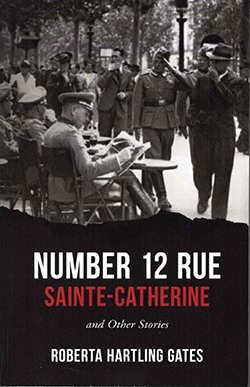Number 12 Rue Sainte-Catherine and Other Stories by Roberta Hartling Gates; Running Wild Press; (c) 2024; ISBN 9781960-018908; 207 pages plus acknowledgments; $19.99.

 SAN DIEGO — This psychological probe into the life of Klaus Barbie, the Gestapo Butcher of Lyon, is highly readable piece of historical fiction starting with his boyhood as an abused illegitimate child and ending with his death in a French jail and reflections from contemporaries on his life and that of his most famous victim, Jean Moulin, leader of the French resistance.
SAN DIEGO — This psychological probe into the life of Klaus Barbie, the Gestapo Butcher of Lyon, is highly readable piece of historical fiction starting with his boyhood as an abused illegitimate child and ending with his death in a French jail and reflections from contemporaries on his life and that of his most famous victim, Jean Moulin, leader of the French resistance.
The book’s title is taken from the address of the Union Générale des Israelites de France, the only Jewish social service agency in Lyon, Vichy France. The address is also the title of the book’s longest chapter. It depicts how the Gestapo under Barbie’s command waited at the offices of the UGIF for unsuspecting people to come in, held them there for questioning, let some go, and put others on transports. The chapter sketches the lives of some of the Jewish victims as well as the lives of some of those people whom Barbie let go, among them a nursing mother.
Another chapter describes Barbie’s sexual liaisons with a French woman who traded sex for the life of her Jewish husband. It portrays Barbie as being sexually inexperienced, putty in the bedroom hands of his wartime mistress.
A subsequent chapter describes the prison interviews of the captured Barbie by a female psychiatrist, who focused on his tortured childhood. When he was an adolescent, the Nazis made him feel welcome while his father and Lyonnaise society treated him because of his illegitimate birth as an outcast. He had a soft spot for his mother, which may have accounted for the leniency he had shown some female prisoners.
In all, the book, in the form of a collection of stories, is a psychological portrait of a man who sought to assure himself of his relevance by torturing other people. A reader might think that this is factual biography, so convincing is the portrait, but then one needs to ask how could a historian, versus a fiction writer, be able to quote verbatim Barbie’s intimate bedroom conversations? Or report the exact words his mother spoke during his boyhood when she tried to soothe him following a confrontation with his father? Or the honeyed speech with which a Nazi recruiter persuaded the adolescent Barbie to become an informer?
So, with so many passages of the book obviously products of the author’s imagination, it’s difficult to know what is true and what is invention. It doesn’t provide the answers to what made “the Butcher of Lyon” tick, but it does offer us a hypothesis.
*
Donald H. Harrison is publisher and editor of San Diego Jewish World.